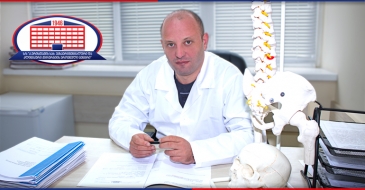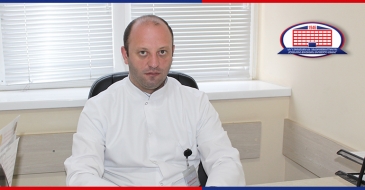Neurosis is one of the most common diseases.
Neurosis is general, nonspecific mental and emotional disorder characterized by anxiety, depression, and other sensations.
Neurosis is a serious disease, to the extent where it may cause people to lock themselves in, stop participating in daily activities and lose contact with relatives or friends.
Unfortunately, cases of acute neurosis are quite frequent due to the fact that patients don’t visit the doctor on time, but instead try to fix the problem on their own without any results.
Nika Kvernadze, neurologist at National Center of Surgery discusses neurosis with us.s
–Mr. Kvernadze, how can we identify neurosis?
- Any type of psychogenic disease diagnosis takes place, when organic disorders are excluded. Mentioned includes complete record of anamnesis, full evaluation of neurological status and laboratory and instrumental examinations, if necessary. However, it should be noted that any disease may indirectly cause neurotic changes by a patient’s worries and ordeals regarding disease.
Symptoms of neurosis are diverse, but the most frequent ones are following:
- Panic;
- Fear;
- Coldness and numbness of limbs;
- Troubles breathing;
- Rapid heartbeat;
- Throbbing sensation;
- Dry mouth
- Nausea;
- Dizziness;
- Anxiety;
- Turmoil;
- Feeling tense
- Easily irritable;
- Attention concentration disturbance;
- Short-term memory disturbance (Often the reason for consultation is short-term memory disturbance);
- Insomnia and etc;
–What can you tell us about forms of neurosis?
–It mainly exists in the forms of anxiety, depression, obsessive-compulsive disorder, somatic and post traumatic stress disorder.
–What causes neurosis?
- Scientists do not know exactly what causes neurosis, but like other mental illnesses, it is the influence of the external stress on a brain as well as genes, during which various circadian rhythms regulating fear, sleep, emotions and etc. are disturbed.
–When should we visit a neurologist?
-As soon as complaint first appears. During this time a person has a terrible discomfort and low quality of life. There are categories of neurosis that need psychiatrist’s assistance.
–What can you tell us about neurosis diagnostic and treatment methods at the National Center of Surgery?
–Neurosis most frequently is a disease with an outpatient profile, nevertheless, I’ve had few patients brought in with various complaints by an emergency brigade.
In National Center of Surgery we have every possibility, laboratory or instrumental examination methods, 24 hours regime that allows us to completely assess patient’s condition and determine treatment tactics.
National Center of Surgery address: Tbilisi, Dighomi, Chachava N5
You may contact National Center of Surgery’s cal center at 577 119 119 or 2 02 25 225
In case of any issues, you may contact neurologist Nika Kvernadze for a consultation at 593 90 64 95.
Wish you health!









